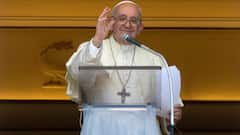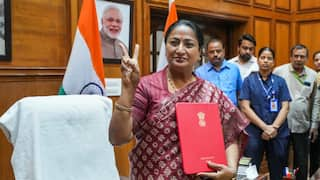Reigns Challenged, Rulers Changed — Big Elections Of 2022
In this article, we discuss some important elections that were held in 2022 and whose results hold critical significance in global politics.

Coming out of the Covid-19 pandemic has been a tough task for individuals, societies, and countries across the world. The unprecedented waves of the coronavirus hit several sectors at once questioning the models of governments everywhere. Like others, world politics also faced a challenge as it gradually embraced the new normal and prepared to continue the usual regime of elections.
2022 witnessed several elections that were crucial as all the countries have gone through nearly similar conditions in the last two years of COVID. Reigns were challenged, rulers were changed, power combinations reshuffled in a number of states.
Here we will take a look at how elections in the US, Brazil, France, Australia, Italy, South Korea, and Philippines changed the course of global politics and introduced a new legacy.
US Midterm Elections: Republicans Get House, Democrats Retain Senate
The US Presidential election in 2020 de-throned the Donald Trump-led Republican government and Joe Biden took the charge of the White House. However, the case does not end here. As soon the results were out, preparations and strategies were being brewed for the 2022 US Midterm elections. Strange it may sound, but the midterm election in America has always been a challenge for the incumbent president and his party. And so, the prepping makes sense.
On record, the midterm elections have gone against the sitting president of the US, but the 2022 midterms results faired really well for the Biden administration. Despite President Biden’s low approval rating, his party was able to retain the Senate, though by a thin margin of 51-49.
The US Supreme Court verdict on Roe vs Wade marked another trouble for the Democrats who feared losing more seats after the revoking of abortion rights in the country.
Ex-US President Donald Trump held campaigns for the polls which did note rally pour in the way he might have wished. However, Republic Party flipped the control of the House of Representatives after it touched the required number of 218. Nancy Pelosi, the first woman to hold the top position of Speaker in the House of Representatives has already announced her resignation as the Republicans take control of the House.
The good thing about President Biden is that he holds onto the Senate and the chances to influence voters through his policies. At a time when his approval ratings are record low and inflation high in the US, Donald Trump has announced his candidature for the 2024 US Presidential Election. The political battle that began in 2020, certainly got fuelled by the midterm results and will witness a fierce tussle in 2024.
Brazil Presidential Election: End Of Jair Bolsonaro's Rule
The Presidential elections in Brazil resulted in the change of rule from right-wing Jair Bolsopnaro to leftist Luiz Inacio Lula da Silva. But as expected, the change of regime brought violent clashes to the fore in the country by the supporters of Bolsonaro, who refused to accept the outcome.
The tenure of Jair Bolsonaro, who is at times compared with former US President Donald Trump both in substance and style, was marred with several controversies not only on the national but international level. He has been criticised for his policies on Amason deforestation, and handling of the Covid-19 situation among others. Braszil recorded the second largest number of deaths during the coronavirus pandemic, after the US.
Following what had happened in the US post-presidential elections in 2020, Bolsonaro questioned the country's electoral system and the supreme court. His silence only increased the intesntiy of violence.
Bolsonaro, a supporter of the military dictatorship that ruled the country from 1964-1985, said after 40 days of violence that it hurt his soul. According to Reuters, he said, "Who decides where I go are you. Who decides which way the armed forces go are you." He added that the armed forces were Brazil's wall to prevent socialism in the country, adding that "nothing is lost" and their cause would prevail one day, the repoprt added.
Brazil's Superior Elctoral Tribunal (TSE) has also upheld the validity of elections by rejecting the challenge put forth by Bolsonaro's allies saying that the plea was in "total bad faith". The court had also fined the petitioners of $4.3 million.
Brazil's new president Lula da Silva is a founding member of the Workers’ Party. He served as President of the country twice from 2003 to 2010 and left office with an approval rating of 80%, reported abc NEWS.
France Presidential Election: Macron Becomes First President In 20 Years To Be Re-elcted
French President Emmanuel Macron did what many feared may not happen as history has not been kind to a sitting French president. Only one president since 1988 has survived reelection and thus Macron becomes part of history in France's presidential polls.
Centrist Macron faced a direct challenge from far-right leader Marine Le Pen against whom he had contestd in 2017 too. The danger for him was the softer tone of Le Pen. Her party National Rally is known for its anti-immigrant and anti-Euopean Union stand which would have come as a danger to the entire EU. However, this time, she talked more about inflation and governance rather than the policies of her party which was formerly known as National Front.
However, it seems that Le Pen's attempt to woo moderate voters has certainly palyed on the ground as the difference in votes between her and Macron fairly reduced as compared to the 2017 results. Emmanuel Maron got around 58 percent of votes while Le Pen secured a little over 41 percent. What is important here is, Le Pen gained around 8 percent votes while Macron lost 8 percent. Analyst predicts that the numbers suggest a really tough next fiver years for the President Macron who has had several challenges on his plate during his first stint at the top.
Next year's Parliamentary elections will be a game changer as it will decide if Macron gets power to propel his pro-EU agendas or faces some serious challenge.
Australia Parliamentary Election: Scott Morrison's Tenure Ends After Albanese Wins Polls
Former Austalian Prime Minister Scott Morrison's controversial climate policies, the contention over Covid-19 vaccines, rapid bush fires and the 'Black Summer' of 2019-20 proved dismal for him after he lost to centre-lef Labour Party leader Anthony Albanese.
Australian Labour Party crossed the magic number of 76 by claiming 77 seats while Morrison-led Labour National Party Coalition could manage only 58. The results, however, were not astonishing as Morison's approval rating remained record low due to various issues that he touched during his reign and several which he did not.
Interestingly, the polls before elections suggested Labour party's win but citizens preferred Morrison to Albanese at PM. He has been criticisd for shutting the international border during Covid in a stricted manner than most of the countries, the sexism row that hit the Parliament. But, one of the core causes of his fall reamins climate actions that he did not act upon in the world which getting warmer day by day.
Prior to the COP26 climate change conference in Glasgow, Scotland, he released a plan to get Australia to net-zero carbon emissions by 2050. And reversely at COP26, Morrison refused to sign onto a global compact promising a 30 percent curb on methane emissions by 2030.
Italy Election: Far Right Government Gets Elected
2022 has been a rollercoaster year for the European Union with two of its foundational members, France and Italy, into the polls. While pro-EU regime would continue in France as President Emmanuel Macron won another term, the same cannot be said for Italy. The far-right coalition has succeeded in claiming governance in Italy with Giorgia Meloni as the president. The political regimes in Italy have never been statble with the country having 67 cabinets in the last 76 years of its existence, reported euronews.
Following the 2020 referendum, the citizens voted to elect 400 parliamentarians instead of the previous number of 618. The number of senators also got reduce to 200 from earlier 315. The election itself was a surprise as it was supposed to take place in 2023. But, former Italian PM and the president of Five Star movement Giuseppe Conte pulled back his support to Mario Draghi's government, and set the stage for elections before schedule.
The new government in Italy has deep roots in the far-right domain of the school of thought. It was founded by neo-Nazis in the 1980s and has direct descendentas of dictator Benito Mussolini. Newly elected PM Giorgia Meloni has, on several occasion, put firth her view on Muslims and LGBTQ community which does not go in good direction in any way. Political analysts are keenly watching the regime to understand if it will bring some hurdles for the EU or the world.
Elections In South Korea: People Power Party In Power
South Korea witnessed a change of rule and the ruler this year with former president Moon Jae-in losing the elections and Yoon Seok-youl of the People Power Party (PPP) taking charge as the new president of the country. PPP came into existence in 2020 and within two years, reached the point where it will rule South Korea. The rule says that a president cannot serve another term as President so it was sure the Moon will not be ruling South Korea again.
A tough political battle marred with allegations was held between Lee Jae-myung of Moon’s liberal Democratic Party and Yoon Seok-youl of the People Power Party. But it seems PPP, which is popular among youth, made it to the end successfully, though with a small margin.
Moon’s tenure saw the Covid-19 crisis management going from brilliant to worst as the nation battled severe spike in the cases. The rising unemployment and cost of living under Moon’s reign are other factors contributing to his defeat.
Philippines Election: Rule Back To Dyansty
The southeast nation of the Philippines elected Ferdinand Marcos Jr (also known as Bongbong) as its new president amid a declining economy and rising poverty conditions. Marcos Jr is the only son of dictator Ferdinand Marcos, who ruled the country for around two decades before it was challenged by the people in 1986. The Marcos family along with a 28-year-old Bongbong fled to Hawaii. He later came back in 1991 and since then, has been trying to paint a positive picture of his father’s reign.
Former president Rodrigo Duterte put a intensifying fight against the drug lords in the country but he couldn’t revive the falling economy of the the Philippines which is badly hit by the Covid-19 pandemic. Furthermore, China’s incrasing military presence in seas between Philippines is another concern that Duterte has not been able to address very well.
Will Marcos Jr carry on the legacy of his father or will there be a tone-down rule, the country will be keenly watched by coiuntries across the world till the next eelction for sure.
Trending News
Top Headlines









































